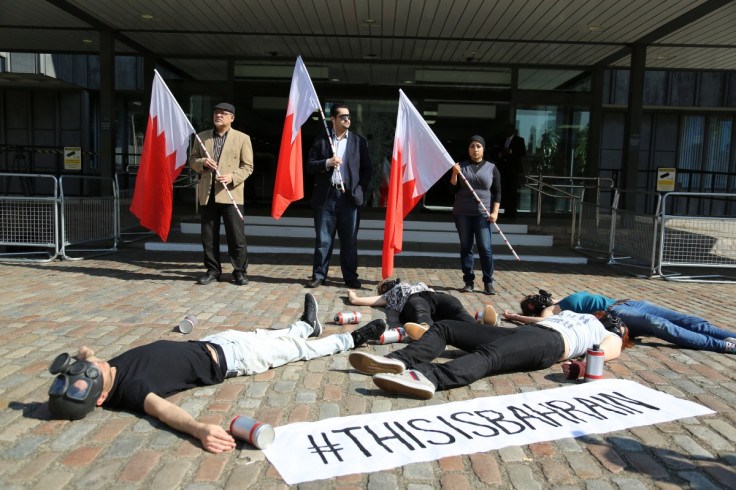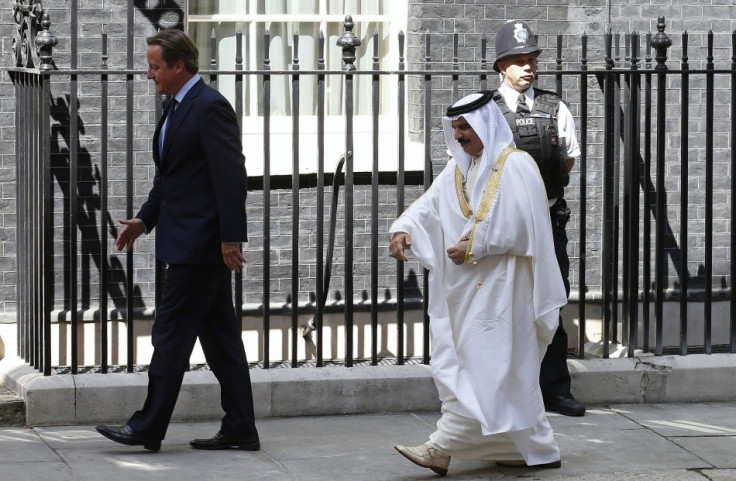Nabeel Rajab Interview: Bahrain 'Bought British Government's Silence' Over Human Rights Violations
A world-renowned Bahraini activist has accused the British government of supporting the bloody al-Khalifa regime in the Gulf Kingdom despite daily human rights violations, because of business interests.
Nabeel Rajab, who is president of the Bahrain centre of human rights (BCHR) and was recently freed after spending two years in prison for taking part in "illegal gatherings", told IBTimes UK that the Bahraini government "have bought the silence of the British government by increasing the business" since the start of the crackdown on peaceful protesters in 2011.
"The arms trade has increased, the business between the UK government and Bahrain has increased after the crackdown over 30% ," he said. "That's why you see not only silence in the British government but also harassment to human rights defenders and even to the people living in this country and who came seeking asylum from Bahrain."
Britain sold Bahrain military equipment worth £18m in 2013, according to the Campaign against the Arms Trade (CAAT), and wants to sell Bahrain Typhoon jet fighters estimated at £1bn.
Rajab, one of several pro-democracy campaigners arrested in the regime's clampdown, was considered a prisoner of conscience by Amnesty International.
Treated "like criminals" at Heathrow
Upon arrival in the UK, the 50-year-old activist was held at Heathrow Airport along with his wife and two children for five hours at a temporary detention centre. Their luggage was searched and they felt they were treated "like criminals". He was also interrogated about his sentence and imprisonment in Bahrain.
"Those who are widely known for their repeated human rights violations are coming to the UK and receive royal manner where human rights defenders - respected people - are treated badly," he said, referring to Prince Nasser bin Hamad al-Khalifa, the King of Bahrain's son.
Sectarianism is a business created by the Gulf ruling families
Prince Nasser - a regular traveller to the UK - faces a High Court judicial review over whether he has immunity in the UK from prosecution for alleged torture. A Bahraini citizen is seeking his arrest following allegations that he was directly involved in the torture of three prisoners in Bahrain during the uprising.
"It should be clear that those human rights violators are not welcome. So far British government showed they can come and go at any time," Rajab argues.
Bahraini-British relations came under scrutiny in May over the announcement of the judicial review into Prince Nasser, even forcing the Queen's son Prince Andrew to withdraw from a Bahraini-funded PR event in London.
The Duke of York has maintained warm relations with the Bahraini regime, with frequent visits as Britain's former special representative for trade and investment. He caused controversy when speaking during a visit to Bahrain last month, when he claimed that what's happening in the archipelago is "a source of hope for many people in the world".
The Queen later welcomed King Hamad of Bahrain at the Royal Windsor Horse Show.
"Sectarianism is a business created by the Gulf ruling families"

After the crackdown on the pro-democracy uprising in 2011, led by Saudi forces, Bahrain has plunged deeper into sectarian conflict between the wealthy ruling Sunni-al-Khalifa minority and the Shia majority.
King Shaikh Hamad bin Issa Al-Khalifa has pledged to implement recommendations by an independent commission of inquiry but reforms are progressing slowly and reconciliation talks have stalled. Violence between riot police and protesters is a week occurence.
Decrees approved by King Hamad include up to seven years in jail for criticising him. All protests, sit-ins and gatherings in Manama are banned indefinitely.
But in Gulf countries such as Bahrain and Saudi Arabia there is no will to stop this sectarian rift tearing the Muslim world apart, according to Rajab, because to halt that process "means getting Shia and Sunni close to each other, asking their governments for democracy.
"Sectarianism is a business created by the Gulf ruling families, thinking they can get away from the legitimate demands of their own nation, by engaging in a conflict between each other. We have countries like Saudi Arabia that have no constitution, no written law."
"I want to continue my struggle in Bahrain"
After Rajab led a demonstration in February 2012 he was arrested and charged with "insulting a national institution" in his tweets. His conviction was overturned after he served a three-month sentence.
I hope they don't send me to jail, torture me, kill me - but even if they decide to do that, I will still go back to Bahrain.
While in prison, Rajab was held in dire conditions and maltreated. He says he was placed in solitary confinement in a cell with a dead animal; held almost naked, with only a small piece of cloth covering his genitals; but the worst abuse was psychological, with no contact from the outside world or visit from family members.
The Bahrain independent commission of inquiry, set up by the Bahraini government itself and headed by UN war crimes expert Cherif Bassiouni, found that detainees are tortured using more than a dozen different techniques, including electric shocks, sleep deprivation and threats of rape.
But Rajab says he is committed to continuing his work inside the Gulf Kingdom.
"I want to continue my struggle from Bahrain. I will continue to do my work from inside," he said. "I know it's costly, I know it's tiring but I have decided to stay. That's the wish of my family members - they don't want me to leave Bahrain and they're willing to pay the price.
"I'm not afraid: it's ugly, it's tiring, it's upsetting, but no, it's not frightening," he said. "When I was inside jail, it was costly for the government as well, it cost their reputation and image abroad. That was the positive part of it. It has brought more attention to Bahrain.
"I hope they don't send me to jail, torture me, kill me but even if they decide to do that, I will still go back to Bahrain.
"We want democracy, we want justice, we want equality. We want to be treated like human beings."

© Copyright IBTimes 2025. All rights reserved.





















